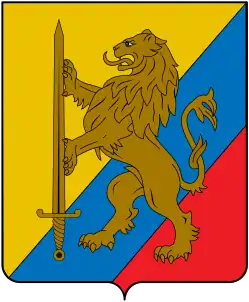Colombian Battalion
The Colombian Battalion was a Colombian Army Infantry battalion that served with the United Nations Command during the Korean War. The first Colombian military unit to serve in Asia, the Colombian Battalion was attached to the US 7th Infantry Division and 25th Infantry Divisions during the war. The battalion was deployed from 1951 to 1954.[1][2]
| Colombian Battalion | |
|---|---|
| Batallón Colombia | |
 The Colombian Battalion insignia used during the Korean War (Army component) | |
| Active | 1951–54 |
| Country | |
| Allegiance | |
| Branch | Colombian Army Colombian Navy |
| Size | Division |
| Engagements | Operation Thunderbolt (1951) Battle of Old Baldy Battle of Triangle Hill |
Background
The election of President Laureano Gómez in 1950 sparked renewed interest in building up Colombian-American relations. Gómez wanted greater U.S. economic support in exchange for direct involvement as an ally, and a means to erase any lingering impressions caused among U.S. policy makers of his previous attitude of anti-U.S. and pro-Germany sentiment during the World Wars.[3] Gómez emphasized the importance of the United Nations security charter and the concept of collective security. As such, he pushed the Colombian military to form an expeditionary force that could be deployed on behalf of the United Nations. The overall strength of the battalion was 5100 infantry soldiers and 300 Navy sailors on board the frigates ARC Almirante Padilla, ARC Capitán Tono, and ARC Almirante Brión.[4]
Korean War
Following the outbreak of the Korean War, the Colombian Battalion was deployed to Busan on 15 June 1951 under the command of Colonel Jaime Polanía Puyo.[1] The battalion participated in Operation Thunderbolt, the Battle of Old Baldy, the Battle of Triangle Hill and the recapture of Geumseong.[5][6] The Battle of Old Baldy was particularly notable for the battalion, as the unit lost (killed or wounded) 20% of its deployed strength in the engagement.[7]
References
- Saldaña, Juliana (2013-04-02). "Colombia's legacy with Korea | The City Paper Bogotá". The City Paper Bogotá. Retrieved 2017-02-15.
- Coleman, Bradley Lynn (October 2005). "The Colombian Army in Korea, 1950–1954" (PDF). The Journal of Military History. Project Muse (Society for Military History). 69 (4): 1137–1177. doi:10.1353/jmh.2005.0215. ISSN 0899-3718.
- Bushnell, Davis The Making of Modern Colombia
- "Medal Hound". themedalhound.com. Retrieved 2017-02-15.
- United States Army Center of Military History, Korea 1951–1953, US Government Printing Office, Washington DC, 1996, p. 278
- Guerra en Corea El Batallón Colombia" (in Spanish). Archived from the original on October 30, 2013
- United States Army Center of Military History, Korea 1951–1953, US Government Printing Office, Washington DC, 1996, p. 278
